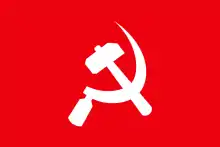Communist Party of Nepal (Unity Centre–Masal)
Communist Party of Nepal (Unity Centre–Masal) (Nepali: नेपाल कम्युनिष्ट पार्टी (एकता केन्द्र–मसाल)) was an underground communist political party in Nepal.[1] CPN(UC–M) was formed in 2002 through the merger of Communist Party of Nepal (Unity Centre) and Communist Party of Nepal (Masal).
Communist Party of Nepal (Unity Centre–Masal) नेपाल कम्युनिष्ट पार्टी (एकता केन्द्र–मसाल) | |
|---|---|
| Founder | Mohan Bikram Singh |
| Founded | 22 April 2002 |
| Dissolved | January 2009 |
| Merger of | CPN (Unity Centre) CPN (Masal) |
| Succeeded by | UCPN (Maoist) |
| Electoral front | Janamorcha Nepal |
| Ideology | Communism Marxism–Leninism–Maoism |
| Political position | Far-left |
| Communism in Nepal |
|---|
 |
|
|
History
The merger of the two parties was announced at a public meeting on April 22, 2002 by the general secretaries of the two parties, Ram Singh Shris of CPN (Masal) and Narayan Kaji Shrestha (Prakash) of CPN(UC).[2][3] The founding general secretary of CPN(UC–M) was Mohan Bikram Singh. The two electoral mass fronts of the two parties, Samyukta Janamorcha Nepal and Rastriya Janamorcha, merged to form Janamorcha Nepal. The Janamorcha Nepal joined the Seven Party Alliance and took an active part in the 2006 Loktantra Andolan.
Splits and dissolution
After the end of the direct-rule by King Gyandendra in April 2006 the CPN (Unity Centre–Masal) was split into four. A minor faction broke away and formed the Communist Party of Nepal (2006), the party later merged into the CPN (Maoist)[4] Mohan Bikram Singh broke away and formed a parallel CPN (Unity Centre–Masal), which later renamed itself to CPN (Masal). The party also formed a parallel Janamorcha Nepal, later Rastriya Janamorcha, led by Chitra Bahadur K.C. and took away with three members of the Interim Parliament from Janamorcha Nepal because of Singh's opposition towards joining the interim government.[5] The other split emerged when Ram Singh Sris broke away with two members of the Interim Parliament from Janamorcha Nepal. The faction also had its own parallel Janamorcha Nepal led by Chitra Bahadur Ale. The faction later merged with other splinter groups of other communist parties and formed CPN (Unified).
After the various splits in the party, Narayan Kaji Shrestha became the general secretary.[1][6]
The party Communist Party of Nepal (Maoist) to form the Unified Communist Party of Nepal (Maoist) on 13 January 2009.[7]
Ideology
The CPN (Unity Centre–Masal) adhered to Marxism–Leninism–Mao Zedong Thought as its ideological basis. CPN(UC–M) favoured a negotiated settlement of the Nepalese Civil War. Their proposal, put forward together with other leftists, was to hold a constituent assembly. The party also opposed US involvement in Nepal.
See also
References
- :: National Election Monitoring Alliance, Nepal Archived 2008-01-22 at the Wayback Machine
- "Political Developments in Nepal - 2002". Archived from the original on 2007-07-07. Retrieved 2007-06-14.
- Nepalnews.com (newsflash) Arc372) Archived 2004-12-24 at the Wayback Machine
- "Rebellion in CPN (Unity Center-Masal)". web.archive.org. 2011-07-17. Retrieved 2020-12-28.
- "Janamorcha Nepal splits up". web.archive.org. 2008-05-16. Retrieved 2020-12-28.
- "PM, Nepal meeting today". archive.is. 2008-01-16. Archived from the original on 2008-01-16. Retrieved 2020-12-28.
- "Nepali leading CPN-M unified with minor communist party - People's Daily Online". en.people.cn. Retrieved 2020-12-28.
External links
- The Tasks Ahead for the Communists – contribution of CPN(UC–M) to the 13th International Communist Seminar